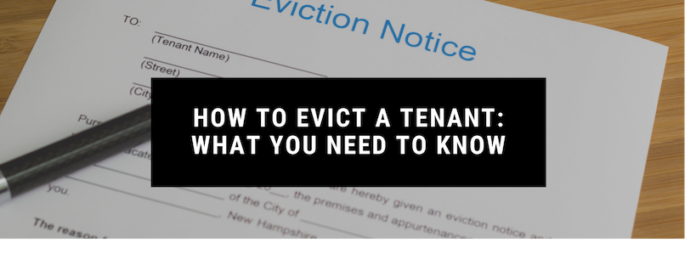A tenant gets evicted every four minutes in the United States. Unfortunately, the tenant you hoped would be perfect can sometimes cause you stress, financial problems, and loss of time while you try to get the situation sorted.
Landlords typically don’t want to evict a tenant. Most of the time, they’d prefer that the tenant held up their end of the deal. Sadly, evictions are sometimes necessary.
In this post, you’ll learn how to evict a tenant, your rights in the event of an eviction, and how to avoid your tenant suing you.
Ready? Let’s get started.
When Can You Evict a Tenant?
There are five common reasons for evictions. These can vary by state, so you’ll need to check your local laws before you take any action.
Here’s when you can evict a tenant:
Health or Safety Violations
If your property has a health or safety violation that needs immediate action, but you can’t fix it while the tenant is on the property, you can file for eviction.
An example could be if you discover the property needs treatment for lead paint hazards.
Illegal Property Use
If your tenant is breaking the law on your property, you can file to evict them. This includes if they’re using the property to run a business.
For example, you may find that your tenant is operating a beauty salon, which would violate both local zoning ordinances and their lease agreement.
The same is true if your tenant is distributing drugs or conducting any other illegal business on your property.
You’re No Longer Planning to Rent the Property
If you’re planning to stop renting your property to tenants, you can file to evict your tenants. Each state has a different law regarding how to handle this situation.
For example, if you choose to go this route in California, you can’t rent your property out again for at least 10 years. You’d also have to give anywhere from 120 days to one year of notice.
You Want to Move in
If you’re planning to move into the property, you’re allowed to evict your tenants. Again, the terms vary depending on the state, and some laws require you to live in the property for at least three years.
You may not be able to evict someone for this reason if they’ve been living in the property for more than 10 years. You may also have to pay for your tenant’s relocation costs.
Breaching the Lease Agreement
When your tenant moved into your apartment, they signed a lease, agreeing that they would abide by the terms in that least.
If your tenants have breached that agreement, you’ll usually be able to evict them.
This is the most common kind of eviction. Here are some of the different types of breach:
- Pet policy violations: If the lease states that your tenants can’t have a pet and they ignore this, they’ve breached the lease.
- Unnamed tenants: The names of everyone living in the property should be on the lease agreement. If you find out that your tenants have unnamed tenants living there, this is grounds for eviction.
- Failure to pay rent: If your tenants are not paying to live in your property, you can evict them.
- Failure to pay rent increase: Most states allow landlords to raise rents by a certain percentage each year. If your tenants refuse to pay the increase, this is also grounds for eviction.
- Staying after the lease expires: This is a ‘holdover.’
- Property damage: You must be able to prove this damage if necessary.
If any of the above apply to your situation, keep reading to learn what you can do.
How to Evict a Tenant
Evicting a tenant can be stressful for all involved. While many people consider the tenant, it’s common to forget the anxiety involved for landlords as well.
It’s important that you keep a cool head during this process. Avoid lashing out, and keep detailed records of all the actions you’re taking.
Here are the steps you should take if you need to evict your tenant:
Never Try a Self-Help Eviction
Even if your tenant is failing to pay, damaging your property, and lying to you, you still can’t take matters into your own hands.
When someone is living in your property, you’ve got a mortgage to pay, or you know they’re causing damage, it’s natural to want to hit back. But it’s important to remember that you’re essentially running a business. That means you have to follow the law.
‘Self-help’ evictions are not legal in any state. These are the type of actions that fall under this umbrella:
- Removing the tenant’s property
- Hiring someone to physically force a tenant out
- Changing the locks (or removing the doors)
- Shutting off utilities like water, gas, and electric
- Harassing or threatening the tenant
Any of the above actions (or similar actions) can cause you more problems than its worth. Unfortunately, even if a tenant owes thousands of dollars in back rent, you’re the one who will be subject to penalties and fines if you attempt a self-help eviction.
Not to mention, it may actually make it more difficult for you to evict the tenant in the long run.
Get Educated
Before you take any action, it’s important that you’ve read (and understand) the Landlord and Tenant Law.
This details the process you must follow when you want to evict a tenant. You need to follow this procedure step by step to win your case. If you skip a step, you may find that a judge decides in your tenant’s favor. That would mean they could sue you in civil court.
Notify Your Tenant
You’ll need to check the process in your state for this, as many states require landlords to give their tenants’ written notice before they can evict them. Some state laws also make you give the tenant an opportunity to correct any problems before you file.
When you write your tenant eviction notice, make sure you include the delivery date of the notice, how long your tenant has to correct the issue (if this is necessary) and which date you’ll be filing for eviction.
File the Eviction
Once you’ve given your tenant adequate notice, you can file for a court hearing. If you had to give notice, you can file the eviction as soon as this waiting period ends. If your state doesn’t require this, you can file for the court hearing immediately.
You’ll do this at your local courthouse, and once you’ve completed the paperwork, you’ll get a hearing date. Don’t worry about notifying your tenant- the court will do that.
Prepare For Court
Make sure you have all the documents you need before the hearing. This includes the lease agreement, the written notice, any bank statements which show returned checks or missing rent payments, and detailed records of every communication you’ve had with your tenant.
This is super important. Evictions can take months, and if you’re not receiving income from that property, you can end up in a bad financial situation. Do yourself a favor and make sure you have all the evidence you need for a successful case. Otherwise, you may need to begin the process all over again.
Ensure you know what you’ll say to the judge before you get there. Make a list if it helps you remember so you won’t forget any key details.
This is also a chance for the tenant to prepare their own case to the judge. That’s why it’s so important that you’ve followed the above process correctly and you haven’t tried to coerce the tenant into vacating the property.
The judge will decide whether the eviction can go forward or whether the tenant can stay. If you win, you’ll receive instructions for the eviction.
Evict Your Tenant
If you’re successful, your tenant will have a period of time to leave the property. This could range from 48 hours to five days, depending on your state. If the tenant chooses not to leave during this time period, you’ll need to bring law enforcement to the property. They’ll remove the tenant and their personal possessions will go outside.
Now’s the time to inspect your property, so be sure to take photos. If the tenant has caused major damage, you can sue them in civil court.
Wrapping Up
By following the above guide, you’ll know how to evict a tenant. However, it’s important that you check your state’s laws before you take any action.
Remember: If you don’t play by the rules, and you change the locks or otherwise make it difficult for your tenant to live in the property, you’ll be making the process worse for yourself.
While evicting a tenant can feel like a long, stressful process, keeping your cool and following the law will get you the resolution you’re hoping for.




















